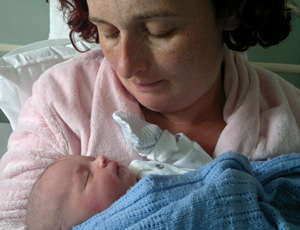Inside or Outside the House, Moms Are Losing the ‘Money Wars’
Although some media outlets make it seem as though women choose to leave or join the workforce, the truth is the decision often has more to do with desperation. The recession is taking its toll on everyone, and mothers are no exception.
Although some media outlets, such as The New York Times, make it seem as though women choose to leave or join the workforce, the truth is the decision often has more to do with desperation. The recession is taking its toll on everyone, and mothers are no exception.
As costs to birth and care for a child soar and wages fall, motherhood can become a financial burden seeped in debt from the very minute a baby is conceived. Meanwhile, the media accuses mothers of “opting out” and calls them “lazy,” or pits women against one another as though there is a rivalry between working and stay-at-home moms. Sarah Kendzior, in her piece published on Al-Jazeera English, disagrees:
The assumed divide between mothers who work inside and outside the home is presented as a war of priorities. But in an economy of high debt and sinking wages, nearly all mothers live on the edge. Choices made out of fear are not really choices. The illusion of choice is a way to blame mothers for an economic system rigged against them. There are no “mommy wars”, only money wars – and almost everyone is losing.
…America is notorious for workplace policies that are unfriendly to mothers – we have among the shortest parental leave of any developed nation, with 40 percent of companies providing none at all. We also have among the world’s most expensive childcare (although our childcare workers are paid a pittance). The average cost of daycare is $11,666 per year, with the average cost in some states as high as $19,000. This means that young parents, still struggling to pay off their massive college loans, are also expected to pay daycare costs equivalent to college tuition…For the average married mother of small children, it is often cheaper to stay home – even if she would prefer to be in the workforce. It is hard to “lean in” when you are priced out.
Regardless of their reasons, all mothers who stay home with children are penalised later by the perception that they “chose” to neglect their career. When they attempt to return to the workforce, their years at home are held against them, considered a “blank spot” on the resume – a blank spot with a reason so obvious and laudable and often involuntary that it is sick we deride it as “choice”.
Kendzior goes on to explain that although women often don’t have a choice in this recession, they have the option to collectively demand change. It won’t be an easy task, she acknowledges, but it’s nothing the women raising children in one of history’s toughest economies can’t handle.
—Posted by Natasha Hakimi
Your support matters…Independent journalism is under threat and overshadowed by heavily funded mainstream media.
You can help level the playing field. Become a member.
Your tax-deductible contribution keeps us digging beneath the headlines to give you thought-provoking, investigative reporting and analysis that unearths what's really happening- without compromise.
Give today to support our courageous, independent journalists.









You need to be a supporter to comment.
There are currently no responses to this article.
Be the first to respond.